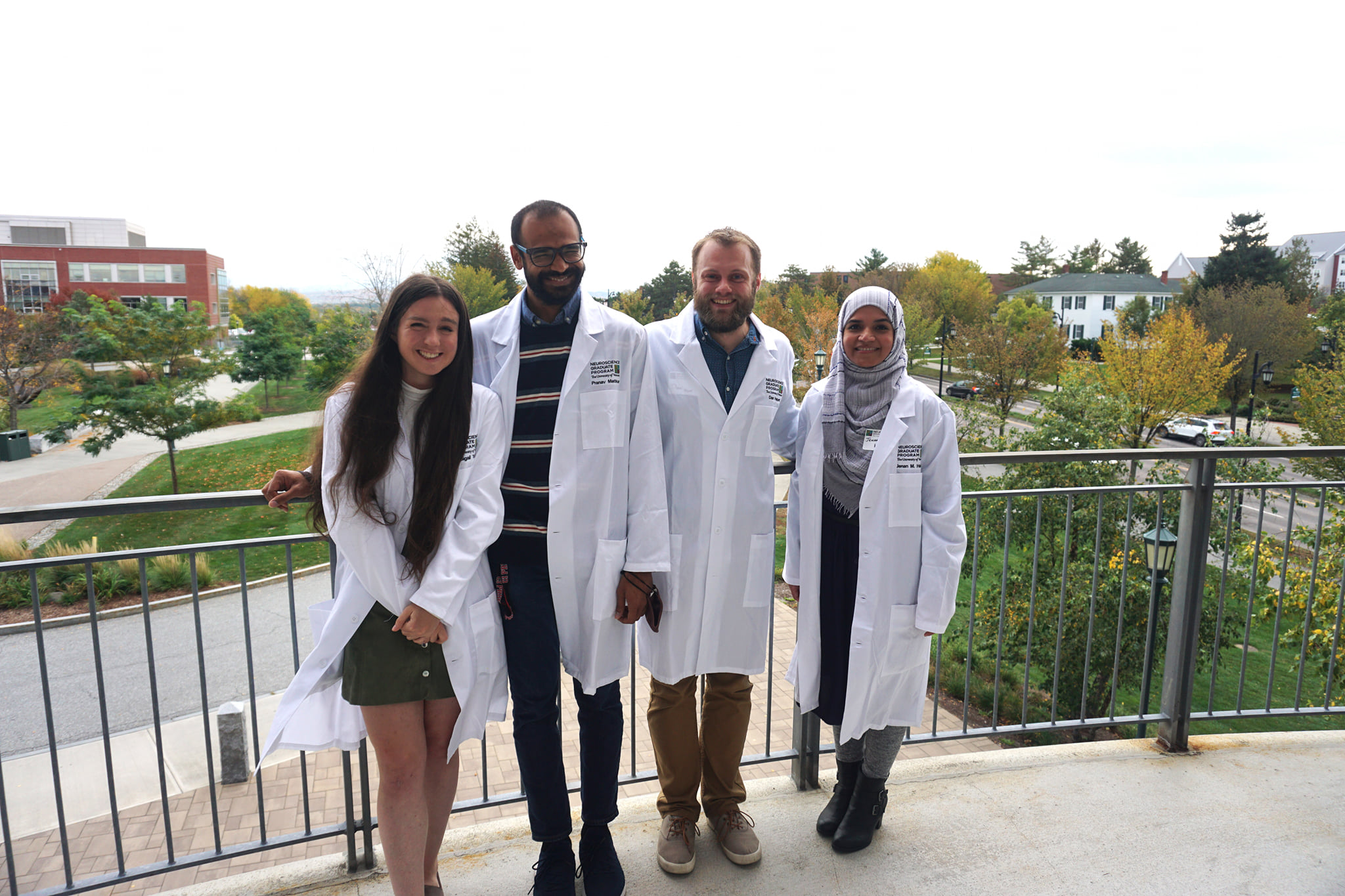Tis the season for coats – white coats that is!
On Friday, October 15, the University of Vermont Neuroscience Graduate Program (NGP) hosted its annual White Coat Ceremony in the Livak Ballroom of the UVM Davis Center.
While often associated with medical education, the White Coat Ceremony for new graduate degree students has its own history, dating back to 1989, according to Haley Olszewski, NGP program administrator. The ceremony is a rite of passage for many graduate students, she says, both “marking the transition of graduate students, particularly in the sciences, from the early, largely course-based phase of their education to the more research intense phase of their training.” The event also serves to “emphasize the relationship between the student and their mentor,” she adds.

(Left to right) Abigail Testo, Pranav Mathkar, Dan Peipert, Jenan Husain
Tis the season for coats – white coats that is!
On Friday, October 15, the University of Vermont Neuroscience Graduate Program (NGP) hosted its annual White Coat Ceremony in the Livak Ballroom of the UVM Davis Center.
While often associated with medical education, the White Coat Ceremony for new graduate degree students has its own history, dating back to 1989, according to Haley Olszewski, NGP program administrator. The ceremony is a rite of passage for many graduate students, she says, both “marking the transition of graduate students, particularly in the sciences, from the early, largely course-based phase of their education to the more research intense phase of their training.” The event also serves to “emphasize the relationship between the student and their mentor,” she adds.
One student who received their white coat during the ceremony, Jenan Husain, says that the ceremony is rewarding and encourages the students to keep going, while also providing students' families with a milestone to celebrate as well.
Like many events in this ongoing era of COVID-19, the event was mostly virtual, with only the students, their mentors, and a few faculty and staff members participating in person. Family and friends were invited to attend live via Microsoft Teams.
The ceremony included a presentation on the history and importance of the ceremony by Anthony Morielli, Ph.D., NGP director and associate professor of pharmacology, and an introduction of each of the second-year students receiving their white coats by their respective mentors, followed by the donning of the white coats, and a small reception.
This year, four second-year NGP students participated in the ceremony, including Husain, Pranav Mathkar, Abigail Testo, and Dan Peipert.
Before receiving their white coats, each student was announced by their mentor, who spoke of their successes thus far and the research they will be conducting in the future.
Mathkar was cloaked by his mentor, Matt Weston, Ph.D., assistant professor of neurological sciences. As a mentee in the Weston Lab, which studies the genetic variants involved in epilepsy and other neurological diseases and disorders, Mathkar will research the effect of mutations in the dynamin-1 protein, which is implicated in epileptic encephalopathy.
Assistant Professor of Pharmacology Benedek Erdos, M.D., Ph.D., presented Husain’s white coat, welcoming her into the Erdos lab as an official mentee. The Erdos lab studies effects of stress on the cardiovascular system and Husain’s ongoing research will focus on “how chronic neuroendocrine stress mechanisms effect blood perfusion, blood brain barrier function, and vascular architecture in the hippocampus,” says Erdos.
Husain says she chose her lab and mentor because "as a young and new neuroscience researcher, [her] goal was to find a lab where [she] can learn at her own pace but with a mentor that will help guide [her] when [she is] stuck." "...I was able to find a mentor that is willing to give me the kind of mentorship I'm hoping for while also doing the research that I am interested in," she adds.
Testo was welcomed into the Dumas Lab as an official mentee of Research Associate Professor of Psychiatry Julie Dumas, Ph.D., whose research focuses on aging, menopause, and associated changes in cognition. Testo’s research will focus on the “relationship between estrogen and changes in functional connectivity during menopause as well as the relationship between estrogen and neuroinflammatory biomarkers,” says Dumas.
Peipert was presented with his white coat by his mentor, UVM Assistant Professor of Medical Laboratory Science Dimitry Krementsov, Ph.D., whose lab conducts research on the role of “gut commensal microbes in multiple sclerosis.” For the next several years, Peipert will research “how A. muciniphila and other microbes colonize the gut, and how they may modulate the immune system to change the prognosis, progression, and severity of multiple sclerosis,” explains Krementsov.
Peipert, whose research interests are influenced by his mother, a dietician who is living with MS, says he chose his lab and mentor due to the comradery and collaboration he saw exhibited in Kremenstov’s daily interactions with his lab members. “It was clear to me that Dimitry is dedicated to his students’ individual academic goals, in and out of lab," he says.
-----
“The Neuroscience Graduate Program at the University of Vermont is a multidisciplinary, Ph.D. granting program that has more than 50 faculty mentors across 9 departments and 5 colleges – the UVM Graduate College, the Larner College of Medicine, the College of Arts & Sciences, the College of Engineering & Mathematical Sciences, and the College of Nursing & Health Sciences. This program emphasizes rigorous training in neuroscience-related research and prepares students for a variety of science related careers in addition to tenure-stream academic careers.”
Learn more at https://www.uvm.edu/neurosciencegrad